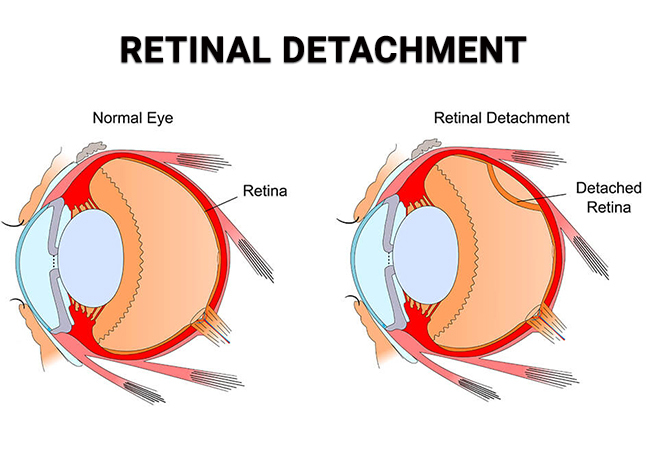 (212) 861-9797
(212) 861-9797
 (212) 861-9797
(212) 861-9797
A detached retina in your eye can lead to blindness, but treatment can prevent your loss of vision. One of the more advanced tools in a top ophthalmologist’s toolbox is the prophylactic laser. Used to treat a variety of eye problems, prophylactic laser eye surgery may be a solution to a detached retina, and it can be used as a preventative measure against retinal detachment. The expert eye doctors at Vitreous Retina Macula Consultants of New York have had success using the prophylactic barrage laser. Call VRMNY today for a consultation to protect your eyesight. Untreated, a detached retina can lead to permanent blindness, so don’t delay.
A prophylactic laser procedure is used in state-of-the-art eye treatments to prevent the further spread of retinal damage. During the laser treatment, an eye doctor surrounds the retinal defect with a targeted laser application. The laser treatment promotes a greater adhesion of your retina to the back wall of your eye, keeping your retina in place and preserving your sight.
Prophylactic laser treatment also reduces post-surgical risks associated with the treatment for vitreoretinal disorders. Considered laser eye surgery, the prophylactic laser is among the more advanced laser surgeries used in eye treatment by ophthalmologists today, including the eye specialists at Vitreous Retina Macula Consultants of New York (VRMNY).
During an eye examination, your eye doctor uses leading-edge equipment for your diagnosis. From an accurate diagnosis, your ophthalmologist creates a personalized treatment plan. Depending on what you need, the plan may include in-office procedures including prophylactic laser eye surgery or other surgical procedures, such as:
Retinal detachment is an eye emergency that happens when a thin layer of tissue on the retina pulls away from its normal position. The detachment separates blood vessels that supply oxygen and other nutrients from the retina cells. The main causes of retinal detachment are eye injuries and advancing age. Other risk factors include diabetic retinopathy, myopia and family history. Symptoms of retinal detachment include:
Failure to treat retinal detachment can lead to permanent loss of vision in the affected eye. Your eye doctor carries out diagnostic imaging of the eye and then reviews your medical history. From the evaluation, your ophthalmologist may recommend immediate retinal detachment surgery through prophylactic laser eye surgery.

Dr. Spades is a truly passionate and understanding individual, and not only it can be seen inside his place of work, but also outside as well. He would go to extreme lengths to provide the most efficient forms of treatment for his patients - he did for me regarding my condition - and his bright charm and attitude is something that can really make one’s day.
JOSEPH P. GoogleWith advances in eye laser treatments, doctors have identified prophylactic laser treatment for a wider range of eye conditions. Eye conditions your eye doctor can treat using prophylactic laser eye surgery include:
Your experienced ophthalmologist at VRMNY relies on prophylactic laser treatment for any eye disorder that increases the risk of retinal detachment. The procedure is also effective in reducing the risk of complications after a surgery for vitreoretinal disorders. Such complications include macular edema, rhegmatogenous retinal detachment (RRD) and development of vision-threatening retinopathy.
Prophylactic laser treatment is among the biggest innovations of eye treatment today. Prophylactic laser eye surgery is among the most advanced laser procedures used in eye treatment. Some advantages of the eye procedure include:
The high risk of retinal breaks during vitrectomy makes prophylactic laser retinopexy an important part of the procedure. The laser treatment is also effective as a preventive measure for other eye conditions. During your initial consultation, your ophthalmologist at VRMNY explains the steps of the procedure in full. During your discussion, you can ask questions so you understand the benefits completely.
Prophylactic laser retinopexy is a painless in-office procedure, but your doctor may do it in an operating room if you had prior surgery to treat a retinal disorder. Through this laser eye surgery, eye doctors today can prevent complications associated with many types of retinal detachment, such as an RRD. Your NYC ophthalmologist may also use the laser treatment as a preventive surgical procedure for other eye disorders for which the risk of retinal detachment is high. The main steps in prophylactic laser treatment involve:
The eye specialists at the VRMNY support locations in Manhattan, Westchester and Brooklyn. They use the most advanced treatment techniques to prevent eye detachment and protect your vision. With years of researching and performing innovative eye treatment techniques, these eye doctors continue to help New Yorkers of every age. Contact a top eye doctor today at the nearest office of the Vitreous Retina Macula Consultants of New York. It’s the best decision you can make for your eye health.
Let us help you enjoy your life
Call: (212) 861-9797To Speak With An Appointment Coordinator Now